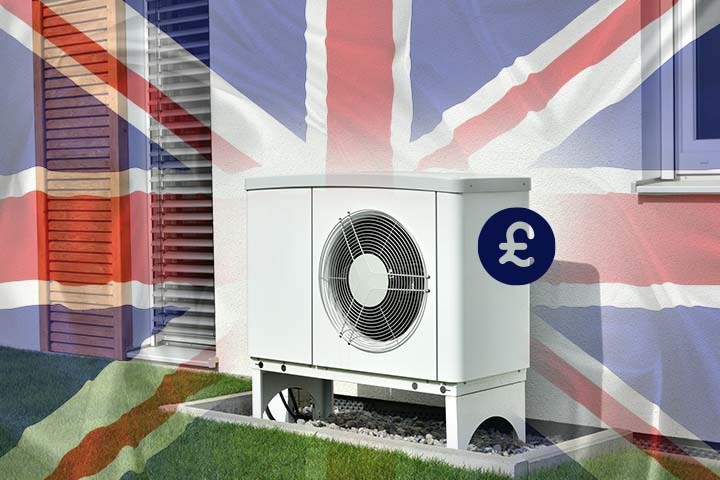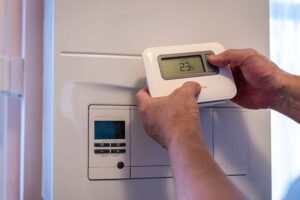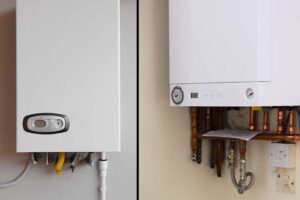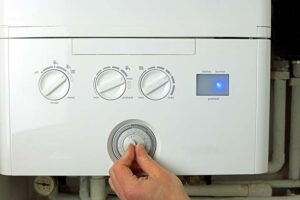Do you think about switching to a heat pump system for your home? With the increase in energy bills and aims at a green future, more people are now looking for energy-capable alternatives. Today is one of the most popular options for the Air Source Heat Pump.
But a common question many homeowners ask: How much does it cost to install the heat pump system in the UK?
In this blog we will break it for you – from installation costs to running expenses, state supplements and professionals and resistance.
Whether you want to store bills or want to reduce your carbon footprint, this guide has all the answers.
What Is a Heat Pump System?
A heat pump is a low-carbon heating system that works by transferring heat from outside your house to the inside. It acts as a refrigerator, but vice versa. In the UK, the most common type of air source heat pump is.
Instead of burning fuel, it uses current to absorb heat from the air (even in cold weather) and uses the heat to heat the home and water.
How Much Does It Cost to Install a Heat Pump System in the UK
Air source heat pump installation cost in the UK depends on several factors, including home size, unit quality and installation complexity.
Here’s a breakdown of typical prices:
| Type of Heat Pump | Average Installation Cost |
|---|---|
| Air Source Heat Pump | £7,000 – £13,000 |
| Ground Source Heat Pump | £15,000 – £25,000 |
Since air source heat pumps are more common and cheaper, most UK households opt for them.
Key factors affecting cost:
- Size and layout of your home
- Type of insulation
- Brand and efficiency of the heat pump
- Complexity of installation
- Whether a hot water cylinder is needed
If your house is well untouched, the system will work more efficiently and can reduce the total installation cost.
Air Source Heat Pump Running Cost
So, how much do you want to pay to drive it after installing it?
On average, the driving cost for the air source is £ 600 – £ 1,200 per year. However, it will be different on this basis:
- Your home’s insulation
- Local electricity rates
- How often you use heating and hot water
- The efficiency (SCOP) of the heat pump
Older homes may face higher running costs due to heat loss. If your insulation is poor, your heat pump must work hard, which uses more power.
Is It Worth Installing an Air Source Heat Pump?
Let’s answer the big question:
Benefits:
- Lower carbon emissions: A great step towards eco-friendly living.
- Efficient energy use: Up to 3x more efficient than gas boilers.
- Long lifespan: Typically lasts 15–20 years with regular maintenance.
- Low maintenance: Requires only annual checks.
- Eligible for grants: Reduce upfront costs through government support.
Drawbacks:
- High upfront cost: Can be expensive without financial help.
- May need new radiators or underfloor heating.
- Installation can take several days.
- Works best with good insulation.
Therefore, while installation costs for the air source can be higher, long -term savings and environmental benefits are often worth it, especially with supplements.
Why Is My Electric Bill So High With an Air Source Heat Pump?
Some users report higher-than-expected bills. Let’s explore the reasons why:
1. Poor insulation:
If your home loses heat quickly, your pump will work harder, increasing electricity use.
2. Incorrect settings:
Running your heat pump at high temperatures defeats its efficiency. These systems work best at low and steady heat.
3. Oversized or undersized unit:
A poorly matched heat pump for your home’s size can cause higher running costs.
4. No smart controls:
Without proper thermostats and zone control, the use of energy can be disabled.
To avoid high bills, work with a qualified installer, ensure proper insulation and learn to use the system properly.
Financial Support and Government Grants
Thankfully, the UK government has several schemes to help you with the air source heat pump installation cost.
1. Boiler Upgrade Scheme (BUS)
This is a major initiative in England and Wales. It offers:
- £7,500 grant towards the cost of an air source heat pump.
- Must replace a fossil fuel system (gas, oil, or electric boiler).
- Property must be privately owned (homeowner or private landlord).
- Installer must be certified with MCS (Microgeneration Certification Scheme).
2. ECO4 Scheme
This scheme supports low-income households with energy efficiency upgrades, including heat pumps.
Before applying, ensure:
- Your installer is MCS certified.
- You meet the scheme’s eligibility requirements.
These schemes can cut your air source heat pump installation cost nearly in half, making the switch much more affordable.
Maintenance and Lifespan
Heat pumps are low-maintenance compared to boilers. But they still need attention.
Basic maintenance includes:
- Annual servicing
- Checking refrigerant levels
- Cleaning filters
With regular care, you can expect your system to last 15 to 20 years.
Pros and Cons of Air Source Heat Pumps
Let’s summarize the advantages and disadvantages of air source heat pumps:
Advantages:
- Eco-friendly – low carbon emissions
- Efficient – uses renewable air heat
- Long lifespan
- Low maintenance
- Compatible with smart thermostats
- Grants available to reduce cost
Disadvantages:
- High upfront cost
- Not ideal for poorly insulated homes
- May require system upgrades (e.g., radiators)
- Performance drops in very cold weather
Understanding both sides will help you decide if a heat pump is right for your home.
Ideal Homes for Heat Pumps
Air source heat pumps work best in:
- Well-insulated homes
- Properties with underfloor heating or large radiators
- Homes without access to gas lines
- Homes looking to lower carbon emissions
They may not be suitable if:
- Your home is very draughty or poorly insulated
- You can’t afford to upgrade radiators or add insulation
How to Reduce Air Source Heat Pump Running Costs?
Want to make sure your system runs efficiently? Here are a few quick tips:
- Improve insulation: Loft, wall, and floor insulation will keep heat in.
- Use steady heat settings: Avoid big temperature swings.
- Install smart thermostats: Control zones and manage heat better.
- Service annually: Keep your system in good shape.
Conclusion
So how much does it cost to install a heat pump system in the UK? While the first investment can be between £ 7,000 and £ 13,000, benefits of energy savings, efficiency and carbon deficiency and carbon deficiency are important.
With state grants, many homes can cut the costs of more than £ 7000, making it a very attractive alternative.
Before you decide, consider:
- Is your home well insulated?
- Can you access a grant?
- Are you looking to lower your emissions?
If you have answered yes, it can be a smart and durable step to install an air source heat pump. Learn more about the full air source heat pump installation process to prepare properly.
Need to help you find the right installer or check the grant eligibility? Make sure you choose a MCS-rooted professional to ensure a smooth and obedient installation.
By planning smartly and using available support, you can enjoy a green, warm and more energy -efficient home.
Frequently Asked Questions
On average, it costs between £ 7,000 – £ 13,000 to install an air source heat pump. The cost depends on your home, isolation and the need for further upgrading.
Yes, if your house is well untouched and you want to reduce the carbon footprint. With grants as upgrading schemes for boilers, the starting costs become more manageable.
Common causes include poor insulation, wrong settings or a signed device. You can reduce the cost of using smart thermostats and improving the insulation.
The benefits include high efficiency, low emissions and long life. Disadvantages include high advance costs and good insulation requirements.
The average operating cost is £ 600 – £ 1200 per year based on insulation, electricity prices and your usage pattern.







